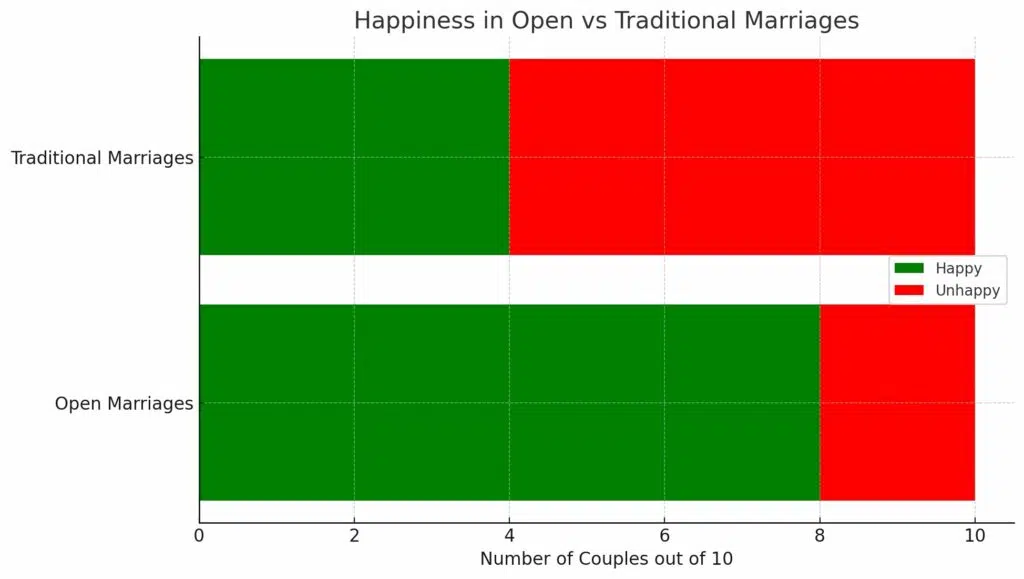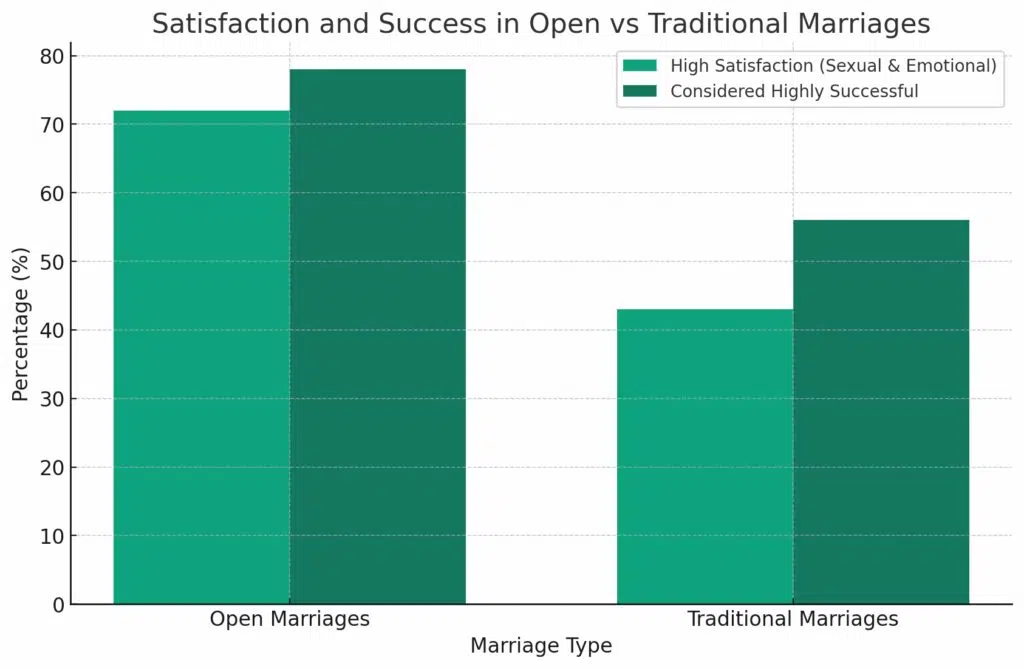Blog » Becoming a Coach » Understanding Marriage Success
Open Marriages Beat Old-School Monogamy: 4 in 5 couples swear
As society evolves, so do the concepts of love, commitment, and marital success. In a world where traditional views on marriage are being questioned and redefined, it’s crucial to explore and understand these changing dynamics. The Coach Foundation has stepped into this evolving landscape with a groundbreaking survey.

Engaging 1000 individuals from first-world countries, including the US, UK, and Australia, the study aims to uncover the realities and perceptions of marital success in today’s world. This comprehensive survey is uniquely balanced, with 500 participants in traditional marriages and 500 in open marriages, focusing on Gen Z and Millennials. It seeks to illuminate the factors that contribute to the fulfillment and success in modern marriages, providing an insightful comparison between these two marriage models.
Key Findings
- A striking 72% (360 out of 500 couples) of respondents in open marriages report high satisfaction with their sexual and emotional life with their partner.
- Contrastingly, only 43% (215 out of 500 couples) of those in traditional marriages express similar levels of satisfaction.
- An impressive 78% (390 out of 500 couples) of individuals in open marriages consider their relationship highly successful, compared to 56% (280 out of 500 couples) in traditional marriages.
- To sum it up, among every 10 couples in open marriages, about 8 report feeling highly satisfied with their relationship, indicating a strong sense of happiness and fulfillment. In contrast, when looking at traditional marriages, it’s a different picture: roughly 6 out of every 10 couples in these relationships express feelings of discontent and restriction, suggesting a significant number are less happy with their conventional setup.
| Marriage Type | High Satisfaction with Sexual and Emotional Life | Considered Highly Successful |
| Open Marriages | 72% | 78% |
| Traditional Marriages | 43% | 56% |
Open Marriages are More Successful Than Traditional Marriages
The survey illustrates a significant shift in marital dynamics from past generations. Traditionally, marriage has primarily been viewed as an economic and social arrangement. This means that in the past, the main reasons people got married were to secure financial stability and maintain social status. Emotional fulfillment and personal happiness often took a backseat in these arrangements.
From our survey findings, it is noticeably observed that out of 10 couples in open marriages, approximately 8 experience high satisfaction in their relationship, reflecting a deep sense of joy and accomplishment.
On the flip side, for traditional marriages, the scenario shifts: about 6 in every 10 couples report feelings of dissatisfaction and constraint, implying that a notable portion find less happiness in their more traditional arrangement

Earlier, couples would enter into lifelong commitments, not necessarily because they were in love, but because it made sense economically or socially. The hope was that love and emotional connection would develop over time. However, these aspects were not the primary focus when the marriage was arranged.
This historical context makes the survey’s findings even more striking. In first-world countries like the US, UK, and Australia, particularly among younger generations like Gen Z and Millennials, there’s a noticeable shift. Now, emotional fulfillment and personal satisfaction are becoming key factors in how people view and enter into marriages. This shift is especially evident in the higher satisfaction rates seen in open marriages compared to traditional ones, indicating a broader change in what modern couples seek and value in their relationships.
Open Marriages Top the Charts in Emotional and Sexual Satisfaction
The contemporary landscape of marriage, as revealed by the survey, shows a different priority set, especially among younger generations.
Participants from open marriages overwhelmingly report greater satisfaction and happiness with their partners, both sexually and emotionally. This could be attributed to more open communication, fewer societal constraints, and a more flexible approach to partnership. A notable 72% of those in open marriages indicate this higher level of contentment, suggesting a successful adaptation to modern relationship norms.
In contrast, the survey reveals noticeable dissatisfaction among those in traditional marriages. Only 43% report a high level of satisfaction in their marital life, pointing to potential issues like lack of communication, rigid societal roles, or unmet expectations. This dissatisfaction could also stem from the changing definitions of personal and emotional fulfillment in relationships.

The study indicates that 78% of individuals in open marriages consider their unions highly successful, a sentiment echoed by only 56% in traditional marriages. This disparity underlines the evolving concept of what makes a marriage successful in the eyes of the younger generation.
Conclusion
This study gives us a real glimpse into how the idea of a good marriage is getting a whole new look in today’s world. It shows that younger folks, like Gen Z and Millennials, are thinking differently about what makes a marriage work well. With way more people in open marriages saying they’re happy compared to those in traditional marriages, it’s clear that what couples want and expect from each other is shifting big time. Evidently, they are redefining success in marriage, moving away from traditional norms and embracing more open, communicative, and flexible relationship structures.
The higher satisfaction rates in open marriages suggest a growing trend towards reimagining the foundations of marital happiness, reflecting the changing values and expectations of modern couples. The findings challenge conventional wisdom and open the door to a broader discussion about the future of marriage in contemporary society.
Methodology
In January 2024, a balanced mix of 1000 individuals from open and traditional marriages across first-world countries were surveyed.


ABOUT SAI BLACKBYRN
I’m Sai Blackbyrn, better known as “The Coach’s Mentor.” I help Coaches like you establish their business online. My system is simple: close more clients at higher fees. You can take advantage of technology, and use it as a catalyst to grow your coaching business in a matter of weeks; not months, not years. It’s easier than you think.
AS SEEN ON
0 Comment